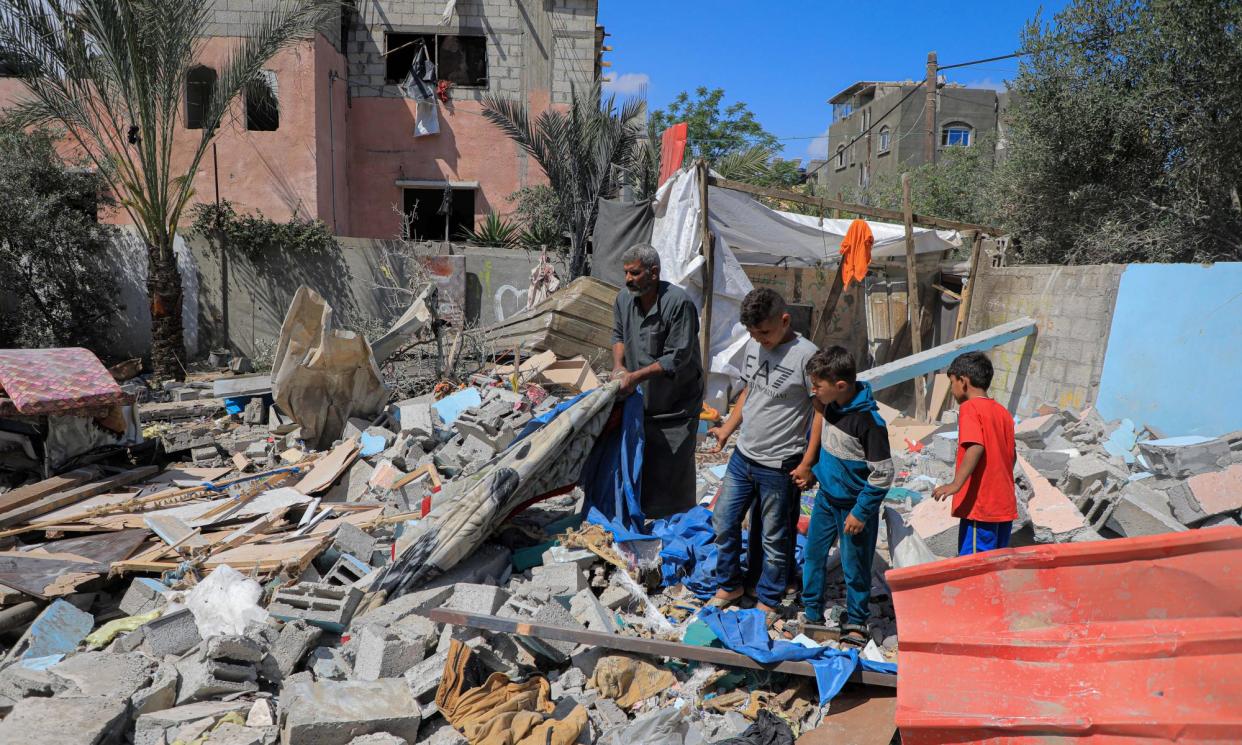‘No safe place’: people in Rafah describe terror as Israeli assault begins

Aid agencies in Gaza have less than a day’s fuel for trucks and tankers that deliver vital food, medicine, water and diesel to millions across the territory, threatening an almost complete shutdown of operations including bakeries and hospitals, officials have warned.
All main entry points to the south of Gaza are closed and there has been widespread looting of existing stocks in Rafah after aid agencies were forced to leave warehouses unguarded following warnings to evacuate the area from Israeli Defence Forces (IDF) ahead of the military offensive launched on the city on Tuesday morning.
“We are down to less fuel than in a single service station. It’s enough to last a day, basically,” said Georgios Petropoulos, head of the Gaza sub-office of UN Office for the Coordination of Humanitarian affairs. “After that, nothing will be moving, and the hospitals won’t be able to keep going for more than two or three days.”
Israeli tanks and special forces took control of the Palestinian side of the border crossing with Egypt in Rafah at dawn on Tuesday after a second night of intense air strikes targeting eastern neighbourhoods of the city.
An Israeli government spokesperson said the long-threatened effort to destroy four battalions of Hamas fighters said to be based in Rafah had begun, as exhausted residents described widespread confusion and terror.
“We had a very terrifying night, with intense shelling and heavy airstrikes. My kids were so scared and unable to sleep … As a believer I am never afraid of death … but I am more worried about the suffering and fear of my children,” said Said Akram Abed Al Nasser Shaikh, 58, a resident of El Geneina neighbourhood in eastern Rafah.
About 1 million people from elsewhere in Gaza are sheltering in Rafah after being forced to flee their homes earlier in the war. Many now living in sprawling tented encampments or overcrowded shelters in schools fear they will be forced to move again, sometimes for the fifth or sixth time, in search of safety if fighting spreads.
“We are very tired as we have moved to eight places since leaving our house at the beginning of this war. Now we will go north to find safety,” said Ghada Lubad, 46, originally from Jabaliya camp.
There is no sign that the Rafah crossing will reopen soon. A second major nearby crossing at Kerem Shalom was shut on Sunday after four Israeli soldiers were killed by rockets fired by Hamas and targeted again with a further barrage on Monday.
Aid officials said they were expecting prices to rise sharply. Though increased numbers of trucks have reached Gaza in recent weeks, this has not allowed any food to be stockpiled after months of acute shortage.
Like many others, Lubad feared the halt in aid reaching Gaza would prompt a spike in prices and shortages of basics such as flour, salt, clean water and medicine.
“This in itself will cause a disaster, as this will lead to high prices and lead to famine,” she said.
Witnesses described frightened families leaving Rafah on foot, riding donkeys, pushing trolleys or packed with their belongings into overloaded trucks hours after reading leaflets dropped by the IDF that told residents and displaced people in eastern neighbourhoods to leave.
The IDF said they had broadcast instructions through “announcements, text messages, phone calls and media broadcasts in Arabic” telling residents to head to an “expanded humanitarian zone” on the coast and around the city of Khan Younis.
Aid agencies said they believe around 200 families every hour had left eastern Rafah on Monday, with similar numbers moving on Tuesday.
“We are monitoring displacement going northwards but a major concern is that we don’t have tents. So we are tracking them but … we are running out of ways to help,” Petropoulos said.
Others said they had decided to stay, whatever the risks.
Jihad Ahmed, 62, a retired police officer in Rafah, said nowhere in Gaza was safe for his family of nine.
“I am very worried as there is no safe place to escape to. I evacuated my family to the centre of Rafah but despite the warnings my son and I stayed at our home for fear that it would be looted.”
While some non-fuel supplies have entered Gaza via the northern Erez crossing in recent days, the UN agencies said this was insufficient and difficult to deliver to Rafah since it meant crossing active combat zones.
Intense clashes around the Nuseirat refugee camp in central Gaza and near Gaza City have prevented movement of aid convoys in recent days.
“Erez will simply not be enough,” said James Elder, a spokesperson for the UN children’s agency. “If Rafah gate closes for an extended period, it’s hard to see how famine in Gaza can be averted,” he said.
The UN has repeatedly accused Israel of restricting aid access despite famine warnings. Faced with international pressure, Israel had pledged to improve access but says UN agencies are to blame for not distributing aid more efficiently within the enclave.
“Where there is hunger in Gaza [it] is orchestrated by Hamas … but we’re getting as much food aid in as possible. If only Hamas would stop throwing mortars and rockets at the crossing points,” an Israeli government spokesperson said on Tuesday.
Mahmoud al-Louh, who had fled with is family of six from northern Gaza to western Rafah, was clinging to the hope of a ceasefire.
“I am very worried about having to start from scratch again as we have already been displaced five times but then I am also afraid of losing any of my family members if we stay. In the end I am a father and I have to protect my children and wife, he said.
“I just pray for a ceasefire soon so we can go home.”

 Yahoo News
Yahoo News 
